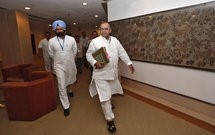 NEW DELHI, July 9, 2014 (AFP) - India's economic growth is expected to accelerate this year and could reach nearly six percent, a key government study said Wednesday ahead of the first national budget by the new right-wing government.
NEW DELHI, July 9, 2014 (AFP) - India's economic growth is expected to accelerate this year and could reach nearly six percent, a key government study said Wednesday ahead of the first national budget by the new right-wing government.
The India Economic Survey, prepared by the finance ministry, predicted growth would be in the 5.4-5.9 percent range in the financial year to March 31, 2015, up from 4.7 percent in the previous 12 months.
"The economy can look forward to better growth prospects in 2014-15 and beyond," said the report released on the eve of the budget from Prime Minister Narendra Modi's government which came to power in a landslide election victory in May.
The consensus forecast by private economists for growth of Asia's third-largest economy stands at around 5.5 percent.
But a weak monsoon could mean growth would come in at the lower end of the range, the report cautioned.
The survey forecast stubbornly high inflation would also moderate by the end of 2014, which could enable the central bank to reduce steep interest rates to kickstart growth.
But the report said massive subsidies used to fund public welfare programmes posed a risk to efforts to improve the health of public finances.
The budget is keenly awaited for statements on how the government plans to revamp the economy which has been hit by two consecutive years of sub-five percent growth and faces a yawning fiscal deficit.
The report laid out the government's priorities in the coming year, including steps to curb the fiscal deficit, restarting the investment cycle in the face of bureaucratic and other delays and improving dilapidated infrastructure.
It also included the simplification of tax policy and the repeal of other unnamed "archaic laws" that prevent economic development.
FICCI's latest Economic Outlook Survey puts across the GDP growth estimate for the year 2014-15 at 5.3%, with a minimum and a maximum range of 4.9% and 5.8%. This is a tad lower than the 5.5% growth estimate put out by the economists in the previous survey round and is mainly on account of bleak prospects for performance of the agriculture sector due to sub-par monsoon forecast.
Respondents however seem more optimistic regarding the performance of the industrial sector this year. The median forecast for industrial growth for 2014-15 is pegged at 3.1% and for agricultural sector at 2.1%. Further, services sector growth is expected at 7.0% this year and is only marginally higher than 6.8% growth recorded in 2013-14.
On the inflation front, participating economists expect prices to remain beyond the comfort zone. The El Nino effect is expected to fuel inflationary pressure going ahead. Sharing their views on dealing with the price situation, the economists pointed out that the announcements made in the recent past by the government to tackle inflation are very much focused. They unanimously felt that the government has little choice but to strengthen supply side infrastructure. There is an immediate need to ease the distortions in supply of food articles – from farm to market. And the forthcoming Budget provides a good opportunity to the government to further move ahead and work on inflation management.
Participating economists expect the fiscal deficit to GDP ratio for 2014-15 to breach the target of 4.1% set in the interim budget. The median forecast for fiscal deficit stands at 4.5%, with minimum and maximum range of 4.2% and 5.5%.
The respondents indicated that they are looking forward to the forthcoming Union Budget and the focus of the budget should be on pushing growth and investments. Some of the other suggestions made by the economists included-
· Clear roadmap for implementation of Goods and Services Tax (GST), which will give a huge boost to the economy. Review of the Direct Tax Code (DTC) with a view to widen the tax base and rationalizing exemptions. These big ticket reforms should be taken up as soon as possible.
· Signal that the government is looking at strict fiscal prudence. Chart out a path to contain subsidies and switch the focus from non-plan to plan expenditure. Put across a roadmap for disinvestment.
· Positive indications for the manufacturing sector would be critical. It is imperative to firm up the growth in manufacturing sector, which will also aid employment generation.
· Boost infrastructure spending. Fast track implementation of stuck projects.
· Indicate way forward on labor reforms
Further, India has the lowest tax to GDP ratio among its peers. The economists were asked for some suggestions to widen India's tax net. They mentioned that steps should be taken to bring more people within the ambit of formal employment and widening the tax base should be given a priority. The respondents felt that segments currently outside the scope of tax net despite being at much higher incomes should be brought under the purview of taxation. The participating economists also said that greater clarity on issues like GAAR and retrospective taxation must be provided in the upcoming budget.
The economists were also asked their opinion about setting up of a specialized asset management company for acquiring/restructuring large scale non preforming assets. In this regard, a majority of respondents was of the view that setting up a specialized asset management company will be a good move as it will help improve the financial health of the banks. Also, it will free the balance sheets of banks providing them the room to lend for other projects.